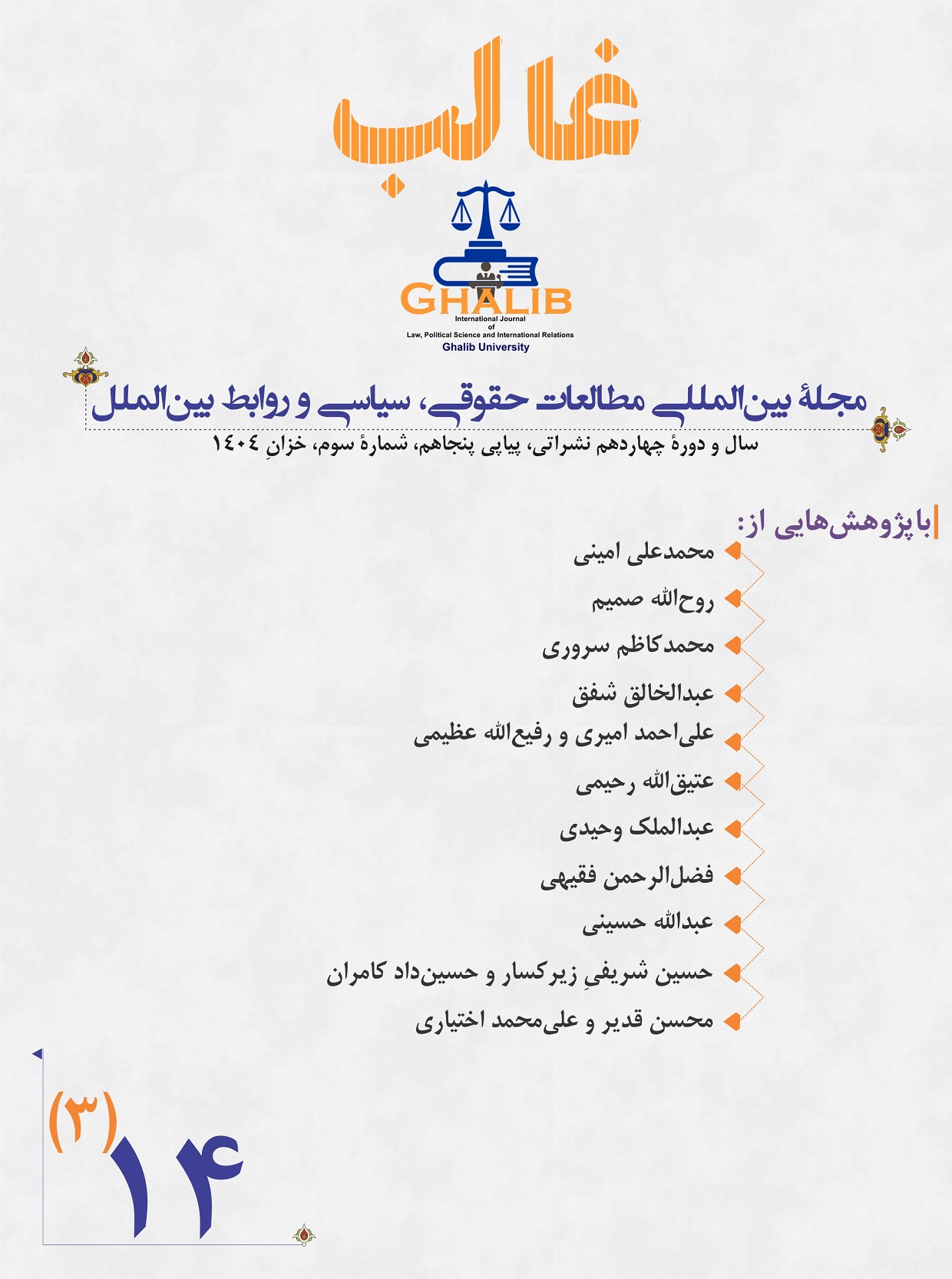The Impact of Legal Frameworks on the Effectiveness of Human Resource Management with an Emphasis on the Mediating Role of Employee Job Satisfaction
(A Case Study: Directorate of Labor and Social Affairs of Herat Province, 2025)
DOI:
https://doi.org/10.58342/ghalibqj.V.14.I.3.5Keywords:
Herat, Human Resource Management, Job Satisfaction, Legal Frameworks, Structural Equation ModelingAbstract
Legal frameworks play a significant role in enhancing human resource management and organizational productivity by establishing order, transparency, and fairness in workplace relations. The importance of this study stems from the need to understand how legal frameworks influence human resource management effectiveness and the mediating role of employee job satisfaction, which can improve employee performance and organizational efficiency. The aim of this research was to examine the impact of legal frameworks on human resource management while considering the mediating role of job satisfaction. The main research question is to what extent legal frameworks affect human resource management and how job satisfaction mediates this relationship. This study employed a descriptive–analytical approach with a survey design. The statistical population included 100 employees of the Department of Labor and Social Affairs in Herat Province, from which 80 valid questionnaires were collected using random sampling. Data collection tools comprised a researcher-made questionnaire for legal frameworks, the Boselie and Wiele (2012) questionnaire for human resource management, and the Minnesota (1967) questionnaire for job satisfaction. The validity of the questionnaires was confirmed by experts, and reliability was verified with a Cronbach’s alpha of 0.81. Data were analyzed using SPSS and AMOS software. The findings indicated that legal frameworks have a positive and significant effect on human resource management (β=0.497) and job satisfaction (β=0.621), and job satisfaction plays a significant mediating role in this relationship (indirect effect: 0.249; T=4.953). The structural equation model demonstrated good fit, and the results suggest that strengthening legal frameworks alongside attention to job satisfaction can enhance employee performance and motivation and improve the efficiency of human resource management systems.
References
Alvani, S. M. (2017). Public Management. Tehran: Nashr-e Ney. [In Persian]
Alvani, S. M., Kheirandish, M., & Fathi, A. (2012). "The Relationship between Leadership Style and Organizational Climate with Organizational Citizenship Behavior." Human Resource Studies, 2(4), 1–30. https://www.jhrs.ir/article_66357.html [In Persian]
Bahmani, C. A., Fetrati, A., & Pedram, M. R. (2019). "Investigating the Effect of Organizational Justice Dimensions on Job Satisfaction: Case Study of Kabul Municipality." Kateb Journal, 6(13), 123–138. https://research.kateb.edu.af/dari/wp-content/uploads/sites/2/2020/05/7.pdf [In Persian]
Bosley, J., & Weil, J. (2012). Questionnaire for Measuring the Effectiveness of Human Resource Management. Tehran: Mad Sage Publications. [In Persian]
Jalalvand, S. (2022). "Evaluation and Assessment of Employee Performance." Eighth Scientific-Research Conference on the Development and Promotion of Educational Sciences and Psychology. Tehran, Iran. https://civilica.com/doc/1510865/ [In Persian]
Jamshidnejad, N., & Agharabparast, R. (2022). "Stages and Criteria for Recruitment and Employment of Human Resources." Seventh International Conference on Management, Psychology and Humanities with a Sustainable Development Approach. Tehran, Iran. https://civilica.com/doc/1664067 [In Persian]
Dalavar, Y., & Mohammadi, M. (2015). "The Impact of E-HRM on Job Satisfaction of Employees in the Central Offices of Agricultural Bank." Second International Conference on Management and Development Culture. Tehran, Iran. https://civilica.com/doc/459756 [In Persian]
Rostami, M. (2023). "Study of Principles and Foundations of Human Resource Management." Scientific Journal of New Research Approaches in Management and Accounting, 7(27), 422–436. https://majournal.ir/index.php/ma/article/view/2356 [In Persian]
Rezaeian, A. (2019). Organizational Behavior Management. Tehran: Samt. [In Persian]
Raeisi, N., & Sharaei, Z. (2021). "Investigating the Effect of Human Resource Management on Employees’ Job Performance with the Mediating Role of Job Satisfaction." Fourth National Conference and First International Conference on New Patterns of Management and Business. Tehran, Iran. https://civilica.com/doc/1394436 [In Persian]
Riahi, P., & Pourshams, H. (2023). "The Effect of Job Security on Organizational Behavior and Job Satisfaction in the Workplace." Quarterly Journal of New Research Approaches in Management and Accounting, 7(91), 267–276. https://majournal.ir/index.php/ma/article/view/2340 [In Persian]
Saadat, E. (2012). Human Resource Management. Tehran: Samt. [In Persian]
Fayeq, Z., & Ahmadi, A. (2025). "Investigating the Relationship between Organizational Justice and Human Resource Productivity in Afghanistan’s Higher Education System (Case Study: Ministry of Higher Education)." Kabul University Scientific-Research Journal of Social Sciences, 6(1), 141–169. https://doi.org/10.62810/jss.v6i1.87 [In Persian]
Faghihipour, J. (2020). Job Satisfaction Management in Administration. Tehran: Faghihipour Publications. [In Persian]
Official Gazette. (1935). Labor Law of Afghanistan. (2006). Kabul: Ministry of Justice Publications. [In Persian]
Official Gazette. (1972). Civil Service Employees Law of Afghanistan. (2008). Kabul: Ministry of Justice Publications. [In Persian]
Mohammadi, M. (2011). Minnesota Job Satisfaction Questionnaire (MSQ). Tehran: Psychometrics Publications. [In Persian]
Maghsam, M., Ghureshi, S. D., & Mousavi, Z. S. (2021). "The Impact of Motivational-Hygiene Factors on Employees’ Job Satisfaction." Second National Conference on Management and Tourism Industry. Tehran, Iran. https://civilica.com/doc/1406950 [In Persian]
Mehrali, Z., & Zakipour Takhtameshlu, F. (2022). "Investigating the Role of Wages and Salaries on Employees’ Efficiency." Tenth International Conference on Accounting, Management and Innovation in Business. Tehran, Iran. https://civilica.com/doc/1497593 [In Persian]
Abu Rumman, M. A. (2022). A framework of legal factors for human resource management. International Journal of Supply Chain Management, 11(5), 6124. https://www.researchgate.net/publication/366780679
Delery, J. E., & Doty, D. H. (1996). Modes of theorizing in strategic human resource management: Tests of universalistic, contingency, and configurational performance predictions. Academy of Management Journal, 39(4), 802–835. https://doi.org/10.5465/256713
Greenberg, J. (1990). Organizational justice: Yesterday, today, and tomorrow. Journal of Management, 16(2), 399–432. https://doi.org/10.1177/014920639001600208
Herzberg, F. (1959). The motivation to work. New York, NY: Wiley.
Maslow, A. H. (1943). A theory of human motivation. Psychological Review, 50(4), 370–396. https://doi.org/10.1037/h0054346
McClelland, D. C. (1961). The achieving society. Princeton, NJ: Van Nostrand. DOI: 10.1037/14359-000














